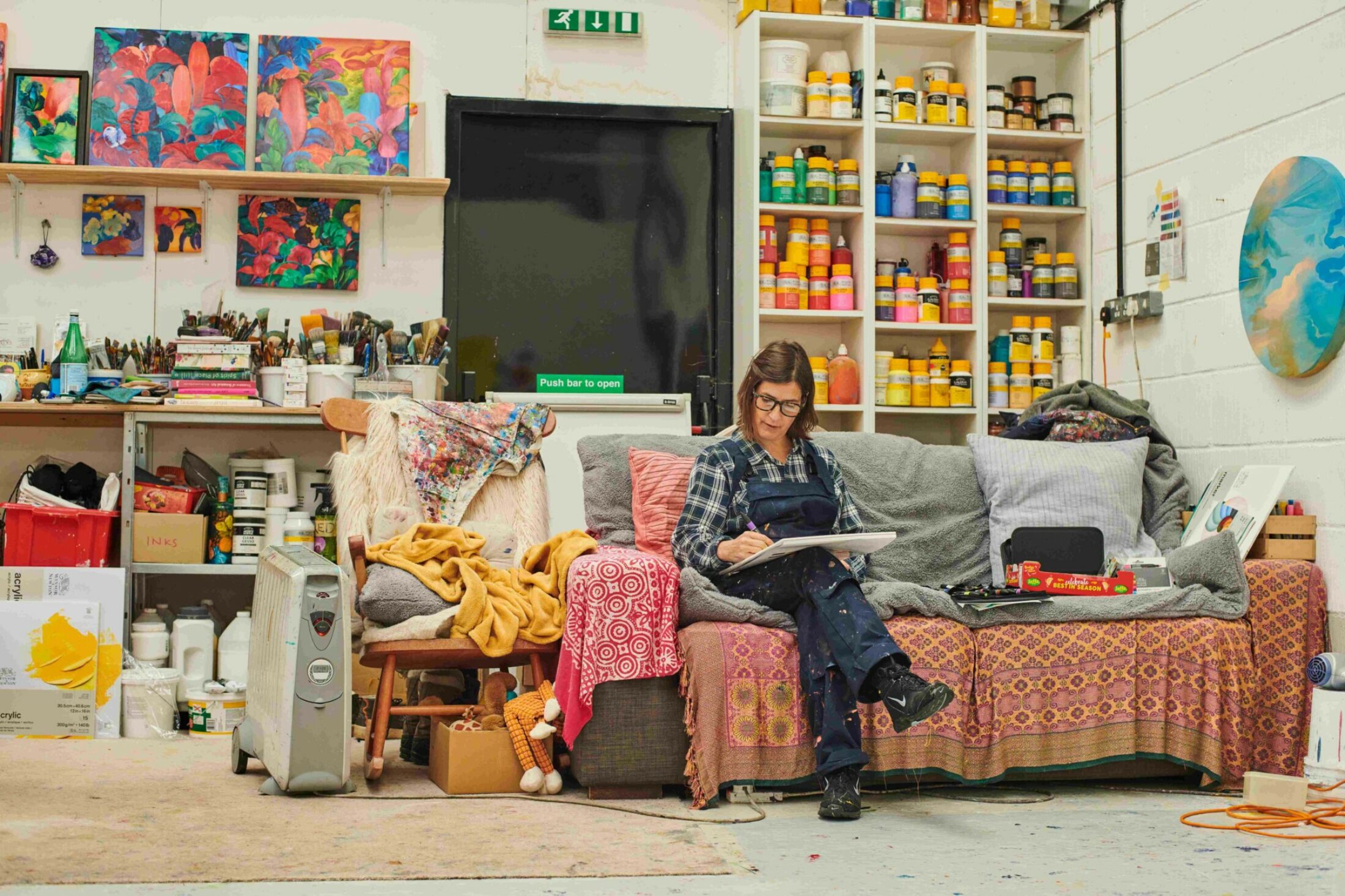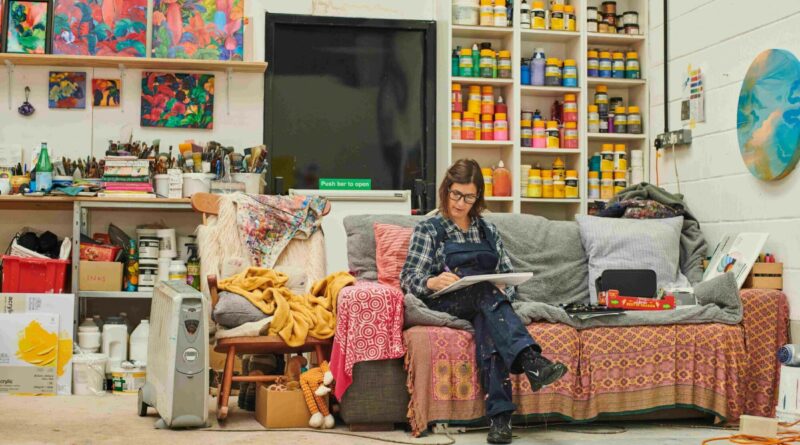Healing skills: how innovation is changing NHS mental health care – Good News
A unique charity is bringing art to England’s mental health spaces, turning unsanitary spaces into centers of creativity.
It was almost 10 years ago that Tim A Shaw and his partner, Niamh White, found themselves visiting a close friend who had been admitted as a mental health patient.
He remembers: “It was really an inhumane, cold, medical place. “Very well. Very claustrophobic. It’s the opposite of where a struggling person should be. It seemed that our friend was disappointed.”
What would happen, the couple wondered, if they drew on their backgrounds in the art world — Shaw is an artist, White a curator — to “bring in artists and change the space? We tend to do good places for other people. It felt like we could translate that into areas of mental health.”
What started as a single project to bring creativity, color and joy to one mental health center – The Phoenix Unit in South West London and St George’s Mental Health NHS trust – recently expanded into Hospital Rooms, a nationally accessible mental health charity. Shaw and White have since created clear, web-based graphics across 25 hospital sites, collaborating with a wide range of care providers, artists, patients and NHS staff.
The process of operation and development works differently in each area, so that the artists involved can respond to the specific conditions in which they find themselves. For the ongoing project at the psychiatric wards in Redruth and Bodmin in Cornwall, for example, “it felt very important for more artists to live in Cornwall”, explains Shaw.
Some projects that have taken place in child and youth mental health centers or in those dealing with dementia care have attracted artists who have their own connection with these problems. “We work with a lot of artists with different styles and different voices, because it makes every project feel dynamic, collaborative and different,” says Shaw.
Many projects involve patients and staff as active participants: not only participating in training as part of the research and development process, but picking up paint brushes or pencils themselves. “We started to realize that there needs to be more and more ways to make art. It doesn’t have to be one voice and one vision,” says Shaw. “There is a responsibility to give people a choice.”
A 2019 project at the Hellingly Center in East Sussex saw artists – including Shaw himself – work with service users to produce the Hellingy Tapestry. This landmark mural, inspired by the site’s connections to the Bayeux Tapestry and the Battle of Hastings, took shape over six months, enabling patients to see themselves and their stories reflected in the finished work.
Shaw explains: “These projects are not just changing the environment of mental health facilities. “They provide an opportunity for mental health patients, professionals and NHS staff to work together and be part of a problem-solving exercise. In the best cases, the culture and dynamics of the ward can also change. ”
Hospitals aim to accommodate 180,000 people diagnosed with severe mental illness over the next three years.
Artist Orlando Broom was one of five artists commissioned by Hospital Rooms to create artwork for Rosebud, a mental health center run by Kent and Medway NHS and Social Care Partnership. Trust. His participation was made possible with the support of Winsor & Newton, who have been providing the Hospital Rooms with art materials, and raising money for charity since the first project.
Shaw says: “Orlanda is someone we wanted to work with for a long time. “He creates these beautiful, fun places, and we thought: ‘What a wonderful thing for a mental health center – where you usually spend a lot of time indoors – to bring something amazing and full of nature.”
The vibrant paintings that Broom painted in the central living room act as “windows into this other world”, Shaw adds.

Orlando Broom creates vivid images of lush and floral landscapes, and water and abstract works. Image: Winsor & Newton
In addition to its work on the ground in mental health facilities, Hospital Rooms now runs a Digital Arts School. The series, which began during the pandemic when the charity was unable to meet its individual projects, sees renowned artists lead online art courses in everything from ceramics to illustration from fashion to drawing and mixing. The materials used in the workshops are all provided by Winsor & Newton, reflecting the company’s belief in the power of art to inspire and heal through creativity.
The Digital Art School’s classes are open to all patients, and to ensure access, the charity is sending boxes of high-quality materials to all 750 patients in England. NHS inpatient mental health areas. “Winsor & Newton provided a lot of paints, paper, brushes, pastels, ink, markers, pens and stickers – it took us six weeks to pack all those boxes and a whole bunch of people,” explains Shaw.
We’re used to making spaces beautiful for other people – it felt like we could translate that into aspects of mental health.
“Usually when you walk into patient rooms, it’s cheap poster paints and dry brushes. There is something very satisfying about using great materials to create something interesting or potentially beautiful. ”
Scale of Digital Art School it is flexible. With all 58 of England’s NHS mental health trusts signed up to take part in the scheme, Hospitals aims to reach 180,000 people diagnosed with a serious illness over the next three years of the mind. “What we’ve always wanted is for Hospital Rooms to make it possible for people in mental health facilities to take part in something creative, and this is a great step towards that,” says Shaw.
The level of the artists involved and the quality of the material provided, is an indication of the charity’s thinking about the need to de-stigmatize mental illness and treatment facilities. “Any national art school would be lucky to have one of the Digital Art School artists as a guide. It’s not a weak type, because it’s something in the hospital. ”
Original image: Winsor & Newton
Be part of the solution
Positive News is helping more people than ever before to have a balanced and empowering world view. While doom and gloom abound in other media, our media is here to support your well-being and empower you to make a difference to a better future.
But our reporting comes at a cost, and, as an independent, non-profit media organization, we rely on the financial support of our readers. If you value what we do and what we are capable of, please get behind our team with a regular or one-time donation.
Give once from just £1, or join the 1,400+ others who give a total of £3 or more a month. You’ll be funding the production and sharing of our stories – helping our media solutions benefit more people.
Join our community today, and together, we will change the news for us.
Support Good News
#Healing #skills #innovation #changing #NHS #mental #health #care #Good #News
